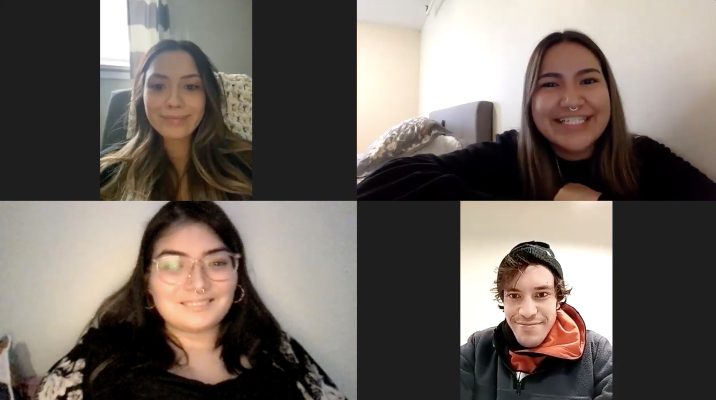Treaty Talks completed 12 sessions of online-based learning of Treaty 11 and 8, as well as land claim agreements and the Metis agreement over the course of two months. In December, Treaty Talks was a finalist for the Arctic Inspiration Prize 2021, with the ceremony taking place in March 2022.
Treaty Talks is founded by Jacey Firth-Hagen, Marlisa Brown and Peter Greenland, Indigenous youth who recognized the need for Treaty education within Denendeh, NWT after the 100 year anniversary of Treaty 11, you can read more here.
The Treaty Talks program is working on having videos accessible in youth centers and public spaces, currently all online based as they want to reach more people. To watch sessions, you can contact treatytalks@hotmail.com
Youth Connecting with Youth
Peter Greenland says, “we typically had 30 to 50 people showing up to the sessions. And we were expecting like 10 to 20. So it was a little bit larger than what we expected. Everything was so much bigger than what we expected with Treaty Talks, we really didn’t expect to be where we’re at, I don’t think.”
Marlisa Brown noticed that certain people kept returning to the sessions, “to see that, I think, for me, it was very, very profound. And I think it also speaks volumes about how much needed Treaty education is available in the NWT… in an accessible and inclusive way. Especially to also be hosted by us, I think that’s obviously a major thing as well. Youth connecting with youth.”
Their main goals for the next round of sessions of Treaty Talks is to build community, develop their programming and look into new programs such as an on the land program. For their next themes, they hope to explore the Yukon, the Berger Inquiry, language and mining in the NWT.
Recently, they have partnered with the University of Alberta to provide a space for the Treaty Talks program to happen in the winter semester.
“Essentially, it will be helping with sort of treaty research as well as producing content for our online platform,” says Brown.
Mande MacDonald, a professer reached out to Treaty Talks from the University of Alberta, “she invited us to go into her class and talk about Treaty Talks. Like we’re focusing on treaty 11, treaty eight, the Inuvialuit final agreements and Metis rights in the Northwest Territories. And I believe in an upcoming semester in the winter semester in January, Marlisa’s going to work on that with Mande, she’s going to give a presentation to the class,” says Firth-Hagen.
Memorable moments
Firth-Hagen says the ‘generational information sharing’ is what captured her attention with their special session, Women Working with Treaties featuring Ethel Blondin-Andrew, Crystal Lennie and Bobbi Jo Greenland-Morgan.
“It was so powerful to see how Ethel knew Crystal’s parents and grandparents… they both have been in politics for a long time with families of political backgrounds. And just seeing how two or three generations of woman can support each other and talk about their experiences being in leadership in the NWT,” says Firth-Hagen. “And then just hearing about stories growing up on the land, stories of hearing Bobbi Jo’s father being involved in the Dene Nation or Indian Brotherhood and Crystal’s background with the Inuvialuit, it’s just really cool generational information sharing.”
Of the speakers, Brown took notice of John B Zoe whom talked about the legends of the Tłı̨chǫ, Yamozha, “…he went back even further talking about oral history as such, with the giant animals…but another aspect of this whole Treaty Talks process is having, (my) nine month old and he’s been along this journey with me too. Treaty Talks always happens around his bedtime but some nights he does stay up to listen and it’s so cute to have him there, being able to absorb all of this information and be in these spaces where we don’t typically hear a lot of Indigenous histories when it comes to treaties. So having that as the focal point to me is so important because those are the people we should be really hearing from or that should have equal weight or value within treaty education.”
For Greenland, he recognized the importance of introducing himself when talking to Fancios Paulette, “I didn’t introduce myself and my family. Sometimes Treaty Talks is happening so fast that I forget to be Gwich’in, you know, and so I only introduced myself to him later…the work that he’s done, he deserves that respect from a youth for them to introduce who they are in, in our communities. And just for some reason, through that process, it dawned on me that I should be introducing myself to use it in these ways, because someday they’re going to be elders.”
“There’s this oral history of what treaties are and our relationship with the land and our relationship with the crown and our relationship with ourselves and our communities,” says Greenland on the legends of Denendeh. “And some people consider them just legends, but I think there was something about this Yamoria or Yormojo, and it’s not coincidental that we all share the same stories of this man and he went around and set the bud of book of etiquette and how we’re going to be working relationship with other people.”
“If anyone’s interested in learning about more being involved being a speaker please pass on information on Treaty Talks, because we want every community in the NWT to be involved. From elders to youth, to community members to leaders, please email us,” says Firth-Hagen.





